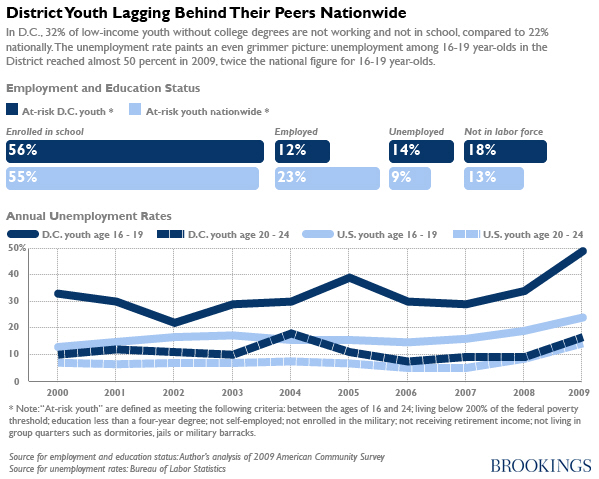In the District of Columbia, far too many young people fail to make a successful transition to adulthood. They drop out of school before earning a high school diploma, a post-secondary degree or training credential with value in the labor market, and ultimately fail to get or keep a good-paying job. The District can do far more to leverage its considerable assets to ensure that youth and young adults stay on track or get back on track to achieve these key educational and employment outcomes.
Current efforts to prepare D.C. youth for careers and post-secondary education are woefully inadequate. While there are pockets of excellence, few programs provide evidence of effectiveness; serious employer involvement remains the exception rather than the rule; partnerships among government agencies, public education (K-12 and post-secondary), and community service providers are often non-existent or ineffective; and information to evaluate and improve programs is usually lacking.

The District and its partners should embrace the following agenda:
- Adopt a goal that by 2022, 90 percent of DC youth will earn a post-secondary credential and obain full-time work by the age of 24.
- Identify how many young people are now falling out of the educational and training pipeline at different points.
- Develop, improve, or expand programs to re-engage them and to support all youth in transitioning successfully to adulthood. Programs should more tightly link secondary and post-secondary education and integrate education, training, work-readiness and youth development principles.
- Develop clear engagement points for employers to work with training providers, public schools, post-secondary institutions, unions and community-based groups in order to provide a pipeline of qualified residents to employers who are ready to hire them.
- Insist on quality improvement and performance measurement. Use the National Youth Employment Coalition’s Promising and Effective Practices Network as a resource, re-orient the Department of Employment Services’ youth portfolio towards a more balanced approach between summer and year-round programs, and improve oversight on both substance and administrative functions like contracting. Close programs that cannot demonstrate effectiveness.
- Dramatically improve the city’s capacity to generate and use data to track the progress of the District’s young people along educational and career pathways and in meeting its goals.
The Brookings Institution is committed to quality, independence, and impact.
We are supported by a diverse array of funders. In line with our values and policies, each Brookings publication represents the sole views of its author(s).



